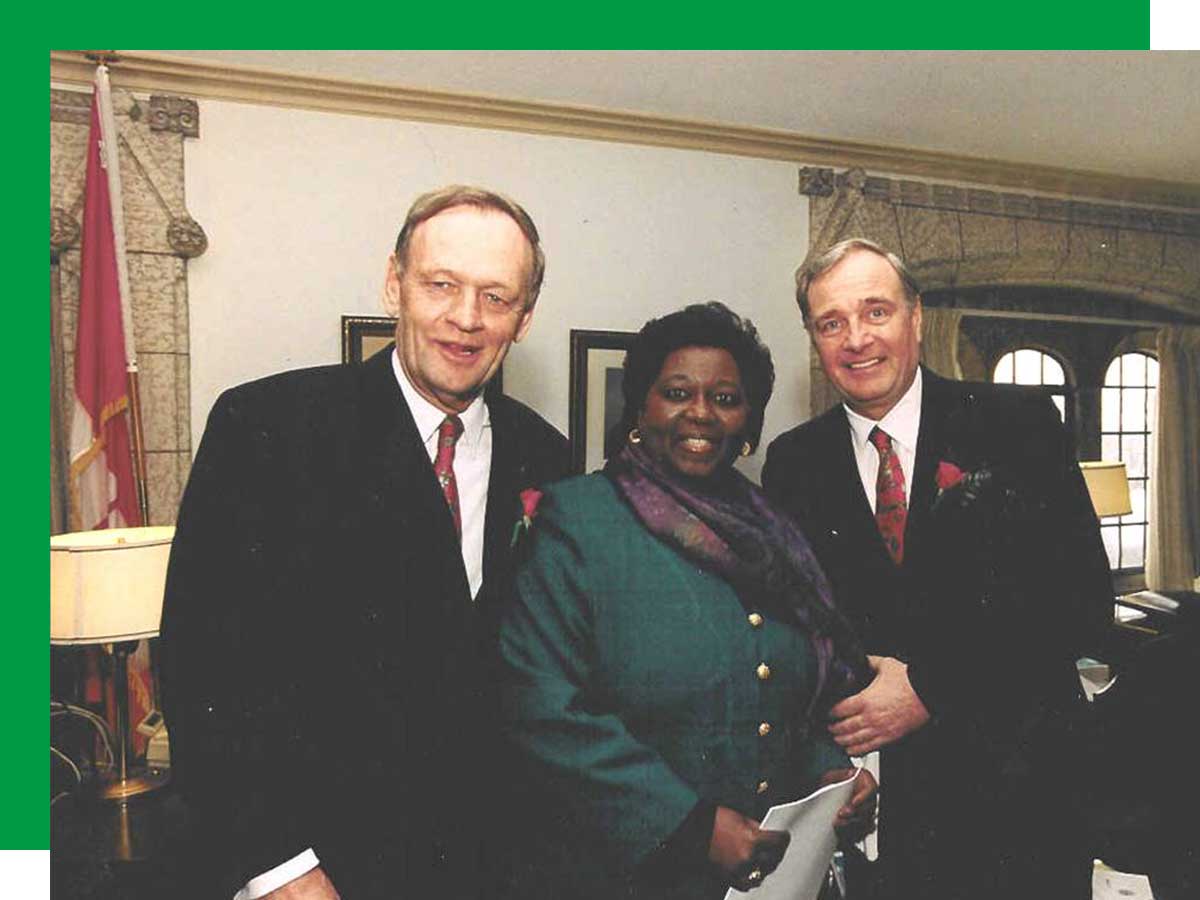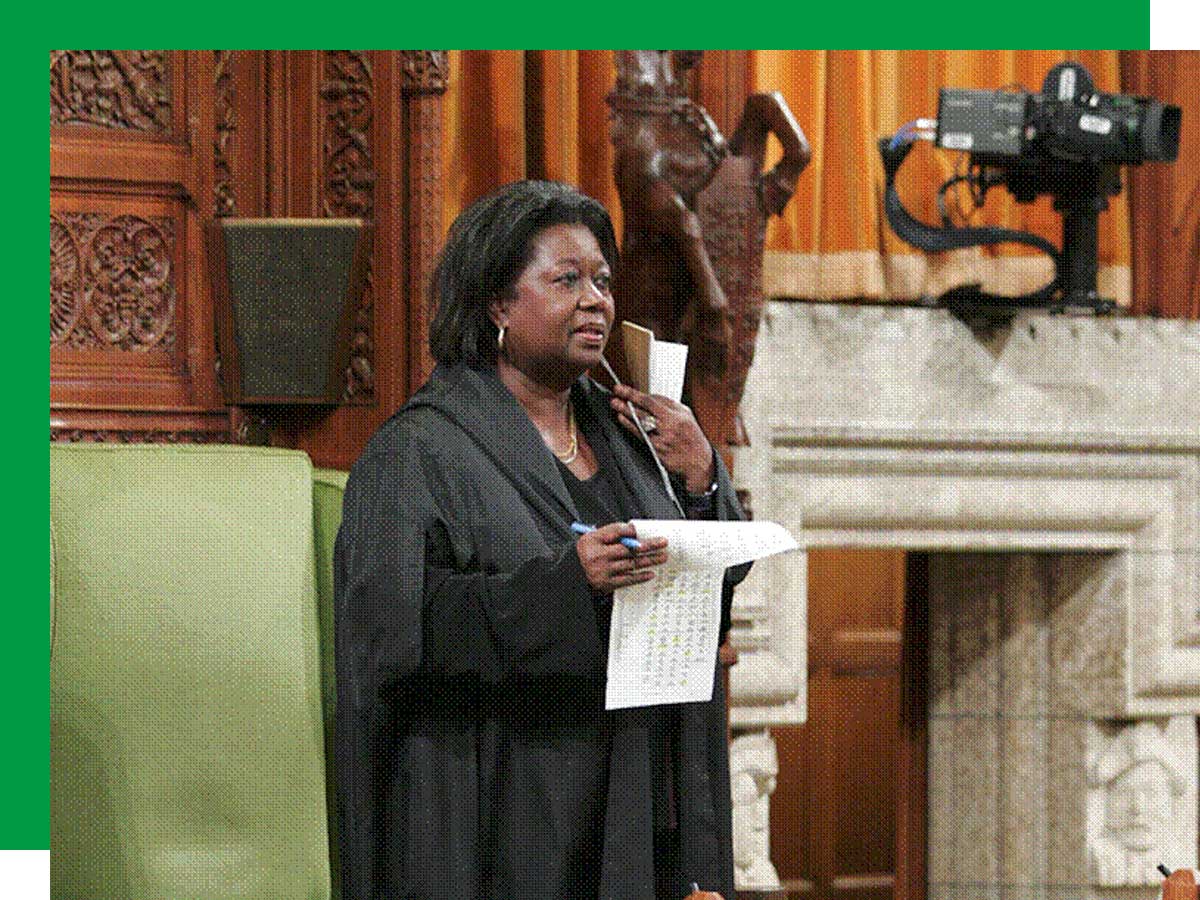In conversation with the Hon. Dr. Jean Augustine: the first Black woman elected to parliament

The Honourable Dr. Jean Augustine was elected to parliament in 1993.
Every year in February, Canada recognizes and honours Black Canadians by celebrating Black History Month. This annual observance is thanks to the tireless efforts of the Hon. Dr. Jean Augustine, Toronto Metropolitan University Honorary Doctorate ’19. Augustine was the first Black woman elected to parliament in Canada. She served four terms before stepping down to pursue new challenges. Among her many achievements, Augustine is widely recognized for single-handedly championing in the House of Commons to have February formally designated as Black History Month.
When Augustine immigrated to Canada in 1960, already having experience in education, she enrolled in teacher’s college in Toronto. She went on to pursue a bachelor's degree and later earned a Master’s in Education while working as an elementary teacher. She worked her way up to school principal and ultimately the supervisory officer, while remaining involved in many community initiatives, such as founding the Toronto chapter of the Congress of Black Women of Canada.

Jean Augustine poses with former Prime Ministers Jean Chrétien and Paul Martin.
Undoubtedly, Augustine is a trailblazer for women of colour, with a career filled with many firsts. In addition to being the first Black woman in parliament, she was the first Black woman to serve in the Cabinet, after being appointed Minister of Multiculturalism and the Status of Women in 2002. She was also the first Black Canadian to be elected Deputy Speaker in the House of Commons. Augustine supported numerous social causes and advocated for marginalized groups throughout her career. Some examples of legislation she brought forth in addition to formal recognition of Black History Month included protections for low-income individuals, including single mothers raising children, and the motion to erect the Famous Five Monument, the only statue to feature women on Parliament Hill. Additionally, she was involved with many committees and boards during this time, such as The Hospital for Sick Children and the Stephen Lewis Foundation, and she served as the National President of the Congress of Black Women of Canada.
After stepping down from parliament in 2006, Augustine became the first-ever Fairness Commissioner of Ontario. The mandate of this office was to ensure Ontarians with professional credentials from foreign countries had fair access to jobs in the province. She served in this position until her retirement in 2015. Augustine has received countless awards for her work as a politician, educator and advocate, including being appointed a Member of the Order of Canada and the Order of Ontario. She has also received the Queen's Diamond Jubilee Medal and was appointed Commander of the Order of the British Empire for her services to education and politics. Augustine continues to champion social causes close to her heart through her involvement in the Jean Augustine Centre for Young Women's Empowerment and 100 Accomplished Black Canadian Women.

Jean Augustine was the first Black Canadian to be elected Deputy Speaker in the House of Commons. She served in this role from 2004 to 2006.
In honour of Black History Month, we ‘sat down’ with the Hon. Dr. Jean Augustine to discuss the past, present and future of Black History Month and what it represents.
1. Your career is full of historic firsts in Canada. What does it mean to you to have broken barriers for the next generation of leaders?
I came to this country because I felt it offered me the opportunity to reach my full potential. Once I arrived, I got together with advocates and activists trying to make this place a fair, just, and diverse society. Through the varied work that I did as a school teacher and volunteer, I realized that women had to be part of that discourse. At that time, many of the early organizations in our Black community had only male leadership. If the President was male, a woman might be the secretary or the public relations officer. With women at the table, important issues for themselves and their families are brought forth; better rules are made, dollars are spent in better ways, etc. So I was constantly pushing this notion as a Black woman, encouraging my female colleagues to contribute and be as involved as possible. Looking back over the years, we've come a long way. The United Nations went on to have a Decade for Women (1976 to 1986). Additionally, the push towards critical mass, the requirement for women to make up 30% of decision-making roles, makes a difference in the discussion. However, we still have a long way to go.
2. Can you describe the process to get Black History Month formally recognized by parliament?
I was an educator working as a Social Studies teacher for students in grades seven and eight. In the Ministry of Education's social studies modules, there was nothing about Indigenous Peoples, and there was very little about people of African descent. At the time, I knew Indigenous people, I knew people who were seventh- and eighth-generation African-Canadian coming from Atlantic Canada, but I didn't know about Canada's entire history. So I was ferociously reading up on those topics and including them in the teaching modules.
Fast forward to 1993 when I was elected to the Parliament of Canada, the climate was different from how it is today. The Reform Party of Canada and the Bloc Quebecois were in the House of Commons for the first time, so the discussions centred around trade, debt, and deficit. Yet, here I was presenting an idea that came up due to the Ontario Black History Society, asking the federal government to make a formal declaration for Black History Month in Canada. At the time, a lot of the Black history discussed in Canada was Black American history.
I firmly believe that Black Canadian history is Canadian history, so I started to advocate for us to do something about Black History Month in Canada. There were two ways to go about it. Either by doing a private member's bill, which meant preparing everything, going through legal, then entering a draw and hoping my bill was chosen at random or a motion, which required a unanimous vote from all 305 members of parliament. I decided to go with a motion, and it came down to one long sentence:
“That this House take note of the important contribution of Black Canadians to the settlement, growth and development of Canada, the diversity of the Black community in Canada and its importance to the history of this country, and recognize February as Black History Month.”
Social media did not exist at the time, so generating support for the motion required printing out documents and approaching members individually. And so, we walked through it until I thought we were at the point where we had enough support. The motion was adopted on December 14, 1995.
3. Has Black History Month in Canada lived up to the expectations you had when you put the motion forward 27 years ago?
Yes, I believe so, but we can always do better. No one can ever fully visualize how something will turn out, but I was hopeful initially. I hoped that it would be an occasion for us to celebrate, to have difficult conversations around the whole history of our presence. It is also a time to stop and reflect and add to our knowledge base. Finally, I hoped it would be an opportunity for us to show excellence and for young people to get to know part of that history. I believe, for many youths, it is a lack of self-esteem that creates difficulties in their lives. It comes from the fact that they're not taught their history and are not fully aware that they descended from people who have made contributions and pushed the barriers to get us where we are today.
I think it's essential that it happens in Black History Month. However, the conversations should not only be limited to February. This month should bring awareness and respect for people of African descent, and it should put a sense of pride in African-Canadians as they tell their history. Leadership in organizations and institutions should recognize African-Canadians' strengths, talents and abilities. The conversation about diversity and inclusion should focus on inclusion—how do we get included? How can we be in every place in Canadian society? Black History Month should highlight the importance of that conversation.
4. What is your hope for the future of Canada?
I hope that we will continue to work towards an inclusive society. I hope that the youth will take the baton. We've made it this far, but we are not there yet. When I look back to the 60s, we didn't have a Charter of Rights and Freedoms, and we didn't have legislation and policy that spoke to social justice and equality. We have to make sure that we are in every institution in society: professors, police people, medical professionals, and STEM programs. We have to ensure that nothing holds us back from reaching our full potential. But, as we talk in Black History Month, I also recognize that we have to be resilient. We have to know that hard work is essential and that we've come this far because our ancestors and those who went before us had to battle to get us to where we are today. I am hopeful that young people will pick up the baton and keep running with it.